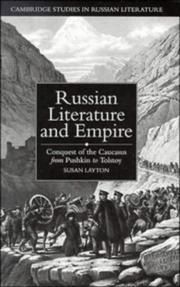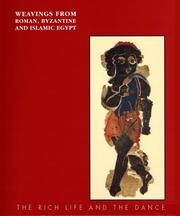| Listing 1 - 7 of 7 |
Sort by
|

ISBN: 0521444438 0521020018 0511554095 9780511554094 9780521444439 9780521020015 Year: 1994 Volume: *8 Publisher: Cambridge : Cambridge University Press,
Abstract | Keywords | Export | Availability | Bookmark
 Loading...
Loading...Choose an application
- Reference Manager
- EndNote
- RefWorks (Direct export to RefWorks)
This is the first book to provide a synthesising study of Russian writing about the Caucasus during the nineteenth-century age of empire-building. From Pushkin's ambivalent portrayal of an alpine Circassia to Tolstoy's condemnation of tsarist aggression against Muslim tribes in Hadji Murat, the literary analysis is firmly set in its historical context, and the responses of the Russian readership too receive extensive attention. As well as exploring literature as such, this study introduces material from travelogues, oriental studies, ethnography, memoirs, and the utterances of tsarist officials and military commanders. While showing how literature often underwrote imperialism, the book carefully explores the tensions between the Russian state's ideology of a European mission to civilise the Muslim mountaineers, and romantic perceptions of those tribes as noble primitives whose extermination was no cause for celebration. By dealing with imperialism in Georgia as well, the study shows how the varied treatment of the Caucasus in literature helped Russians construct a satisfying identity for themselves as a semi-European, semi-Asian people.
Orient dans la littérature --- Orient in literature --- Oriënt in de literatuur --- Romanticism --- Russian literature --- History and criticism. --- 19th century --- History and criticism --- Russia --- Relations --- Caucasus --- Caucasus - In literature. --- Orient - In literature. --- Russia - Relations - Caucasus. --- Caucasus - Relations - Russia. --- Arts and Humanities --- Literature --- Orient --- In literature. --- Caucasia --- Caucasus Mountains --- Caucasus Region --- Kavkaz --- Russie --- Rossīi︠a︡ --- Rossīĭskai︠a︡ Imperīi︠a︡ --- Russia (Provisional government, 1917) --- Russia (Vremennoe pravitelʹstvo, 1917) --- Russland --- Ṛusastan --- Russia (Tymchasovyĭ uri︠a︡d, 1917) --- Russian Empire --- Rosja --- Russian S.F.S.R. --- Russia (Territory under White armies, 1918-1920)
Book
ISBN: 1644694212 9781644694220 1644694220 1644694204 9781644694213 9781644694206 Year: 2021 Publisher: Boston
Abstract | Keywords | Export | Availability | Bookmark
 Loading...
Loading...Choose an application
- Reference Manager
- EndNote
- RefWorks (Direct export to RefWorks)
This literary, cultural history examines Russian tourism via the prism of cosmopolitanism, pitted against provinciality and nationalist anxiety about the allure of Western Europe. The study's thematic axis sets daunting cultural riches of the West against the compensatory Russian pleasure of playing the "European" colonizer on vacation in "Asia.".
Russians --- Heritage tourism --- Cosmopolitanism --- Tourism in literature. --- Cosmopolitanism in literature. --- Russian literature --- Travelers' writings, Russian --- Travel --- History --- History and criticism. --- Russian travelers' writings --- Political science --- Internationalism --- Cultural tourism --- Tourism --- Ethnology --- Slavs, Eastern --- 19th century. --- Anna Karenina. --- Caucasus. --- Crimea. --- Russian literature. --- Winter Notes. --- art appreciation. --- cosmopolitanism. --- empire. --- nineteenth century. --- social history. --- tourism. --- tourists. --- travel. --- vacation.
Book
ISBN: 9781644694206 Year: 2021 Publisher: Boston : Academic Studies Press,
Abstract | Keywords | Export | Availability | Bookmark
 Loading...
Loading...Choose an application
- Reference Manager
- EndNote
- RefWorks (Direct export to RefWorks)
"This literary, cultural history examines imperial Russian tourism's entanglement in the vexed issue of cosmopolitanism understood as receptiveness to the foreign and pitted against provinciality and nationalist anxiety about the allure and the influence of Western Europe. The study maps the shift from Enlightenment cosmopolitanism to Byronic cosmopolitanism with special attention to the art pilgrimage abroad. For typically middle-class Russians daunted by the cultural riches of the West, vacationing in the North Caucasus, Georgia, and the Crimea afforded the compensatory opportunity to play colonizer kings and queens in "Asia." Drawing on Anna Karenina and other literary classics, travel writing, journalism, and guidebooks, the investigation engages with current debates in cosmopolitan studies, including the fuzzy paradigm of "colonial cosmopolitanism.""--
Cosmopolitanism in literature. --- Cosmopolitanism --- Heritage tourism --- Russian literature --- Russians --- Tourism in literature. --- Travelers' writings, Russian --- History --- History --- History and criticism --- Travel --- History --- History and criticism
Multi
ISBN: 9781644694213 9781644694206 Year: 2021 Publisher: Boston, Mass. Academic Studies Press
Abstract | Keywords | Export | Availability | Bookmark
 Loading...
Loading...Choose an application
- Reference Manager
- EndNote
- RefWorks (Direct export to RefWorks)
"This literary, cultural history examines imperial Russian tourism's entanglement in the vexed issue of cosmopolitanism understood as receptiveness to the foreign and pitted against provinciality and nationalist anxiety about the allure and the influence of Western Europe. The study maps the shift from Enlightenment cosmopolitanism to Byronic cosmopolitanism with special attention to the art pilgrimage abroad. For typically middle-class Russians daunted by the cultural riches of the West, vacationing in the North Caucasus, Georgia, and the Crimea afforded the compensatory opportunity to play colonizer kings and queens in "Asia." Drawing on Anna Karenina and other literary classics, travel writing, journalism, and guidebooks, the investigation engages with current debates in cosmopolitan studies, including the fuzzy paradigm of "colonial cosmopolitanism.""--
History --- Cosmopolitanism in literature. --- Cosmopolitanism --- Heritage tourism --- Russian literature --- Russians --- Tourism in literature. --- Travelers' writings, Russian --- History and criticism --- Travel

ISBN: 1883015316 Year: 1999 Publisher: Champaign (Ill.) Krannert art museum
Abstract | Keywords | Export | Availability | Bookmark
 Loading...
Loading...Choose an application
- Reference Manager
- EndNote
- RefWorks (Direct export to RefWorks)
Book

ISBN: 9781501727238 Year: 2018 Publisher: Ithaca, NY
Abstract | Keywords | Export | Availability | Bookmark
 Loading...
Loading...Choose an application
- Reference Manager
- EndNote
- RefWorks (Direct export to RefWorks)
Digital

ISBN: 9781501727238 Year: 2018 Publisher: Ithaca, N.Y. Cornell University Press
Abstract | Keywords | Export | Availability | Bookmark
 Loading...
Loading...Choose an application
- Reference Manager
- EndNote
- RefWorks (Direct export to RefWorks)
| Listing 1 - 7 of 7 |
Sort by
|

 Search
Search Feedback
Feedback About UniCat
About UniCat  Help
Help News
News